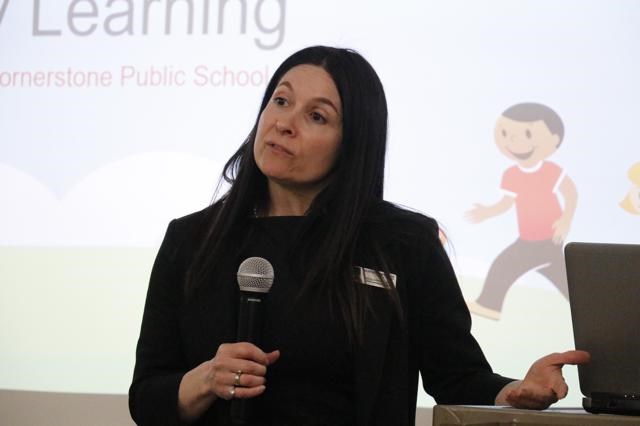The Early Learning program for preschool children in the Southeast Cornerstone School Division has been making a marked difference to children starting school, members of the Rotary Club heard at their luncheon meeting on Thursday.
Jacquie Gibbs, the coordinator for Early Learning for Cornerstone, gave a presentation showing how children have been helped with reading and social skills through the Early Learning program.
She explained how preschool children are assessed to help teachers and parents know what level of help a child might need as they start school.
At Tier 1, 80 per cent of these children are considered ready to learn and can read at their grade level; at Tier 2, 50 per cent of these children will be reading at their grade level by the end of Grade 3; and in Tier 3, these children will require intensive support with assistance by such services as speech-language pathologists. Only about 25 per cent of these children will be able to read at or above their grade level by Grade 3.
Gibbs explained that Grade 3 is a crucially important grade as most children will change from learning to read, to reading to learn as they go on with their primary education. Southeast Cornerstone has set a goal to have 90 per cent children reading at or above their grade level by the end of Grade 3.
By making assessments of children prior to starting in kindergarten, the goal is to get an early start on enabling more children to reach their grade level in reading, writing and other areas, and the studies show that Early Learning is in fact making a difference in this way.
In measuring the reading levels of children at the start of the 2017-18 school year, they found about 56.8 per cent of children were assessed at Tier 1 as ready to learn, and by the end of the school year, this increased by 23 per cent so 79 per cent of children had reached Tier 1.
Gibbs noted there is a “fundamental difference” when students are compared to First Nations and Metis children, “and that gap is widening.”
“We’re not able to make enough of a difference,” she added, commenting that there needs to be much more work done in this area to narrow that gap.
With research showing how and when children learn as their brains are forming, said Gibbs, “It’s important we are reaching out to families and children before they come to school, when those brain synapses are forming.”
An issue for some families is their ability to access services their young child might need, such as speech-language help, if they live in a rural area or a small town. Often the only vehicle these families have is being used by the primary wage-earner, and the caregiver may not have the time or ability to make appointments for services that would assist their child.
Gibbs noted an instance of a family whose child was referred to a speech-language pathologist, but they have been unable to make the appointments, “so they don’t go.”
A resource that Cornerstone has been making use of to help parents is the Early Childhood Intervention Program (ECIP), through which 138 families are currently getting visits in the home. Through ECIP, Cornerstone has certified teachers and Early Learning teachers who are able to make a home visit and help parents with their children in learning their basic skills.
Cornerstone took over the ECIP program in 2011, noted Gibbs, and began by helping 32 families, which grew over the following years as people became more aware of their services.
Explaining the mindset of ECIP workers who make the home visits, Gibbs said, “When we go into a home, we don’t want families ever to feel they’re not enough. They’re doing a great job, and want to do better, and we strive to empower parents, not make them feel like they’re doing a bad job.”
As they’ve assessed children who are getting help early on, she said, there has been marked growth in all areas, such as with fine motor skills, gross motor skills, adaptive skills, communication skills and social skills.
Another resource they are using is the Pop-up Playground program, which has gone into smaller communities for families with young children to take part in. These provide play-based learning for children aged three to four, and information for the parents about what services and programs are available to them.
The pop-up playground program often is held in local libraries which many small towns have, and this encourages the families to make more use of those libraries also.




